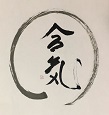Relationships are typically impaired through conflicts. Looked at broadly, martial arts training is a physical manifestation of conflict. No one strikes someone because they think it will make their fist feel good. They do so because they have worked up their emotional state to firmly believe the other party is deserving of pain and harm, and they wish to inflict it even to their own detriment. This is a fairly extreme state.
Martial arts training evokes existential questions through its very physical movements and practice. The search for efficiency begs the question – who succeeds and who fails. Who lives, who dies?
Some of the quotes elsewhere on this site address the topic. A second-generation student of Bodhidharma, originator of Shaolin Kung Fu as one of the most ancient martial arts, explains, “…Be neither for nor against. For and against opposing each other – this is the mind’s disease...”
The founder of Judo, a more modern martial art, says, “…harmony can only be attained and retained by mutual aid and concession, leading to mutual welfare and benefit. This mutual aid and concession is therefore another fundamental principle of Judo which is very important for the keying-up and perfecting of social life. Cannot, then, this same principle be applied in a similar way to international relations?”
Similarly, the founder of Aikido explains, “Aikido is ai (love). You make this great love of the Universe your heart, and then you must make your own mission the protection and love of all things… the very enemy is eliminated… the entire world must be in harmony. Then we do not have a need for atomic and hydrogen bombs…”
These profound practices are designed to bring peace to a conflict-ridden circumstance and win over the respect of an adversary. Social relationships are naturally improved.
But avoiding negative interactions is only half the battle. By eliminating the source of conflict, otherwise known as the enemy within, one has also eliminated the obstacles to providing even greater benefits to the other people with whom we interact. As we find ways to be useful to friends, family and society in general, other people find a greater need for us in their lives. Appreciation and reciprocation start to replace anger or hostility as we change enemies into friends. Thusly the world around us improves. To quote the Founder of Aikido, “It can be a comfortable and pleasant world.”
The pages in this section go sample some of the instructions of advanced practitioners to give some idea of the training.
